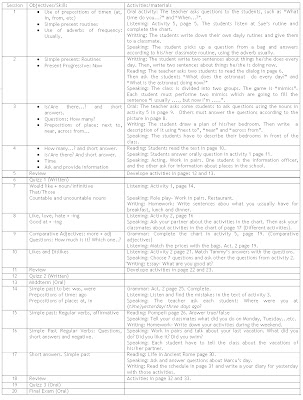Based on Penny Ur. "A Course in Language Teaching".
HOW NECESSARY IS A COURSEBOOK?
That’s the question that Penny Ur asks in her book “A course in Language Teaching”. Actually, is an excellent question, considering that the most of our schools use coursebooks, and, furthermore, our Ministry of Education distribute coursebooks to every school supported by the Goverment.
But, again, how necessary are they? Can we, teachers of English, live without them?
Few sessions ago, we checked this testimony:
“Maria:.They made us read the national syllabus in my teacher-training course, but I haven't looked at it since. What for? ln my [state] school we use a class coursebook which lays out all the language I have to teach, as well as giving me texts, exercises and ideas for activities. I assume the Ministrv would not have authorized the book if it didn't accord with the syllabus, so there's no reason for me to double-check if l'm teaching the right things”. (Penny Ur. A Course in Language Teaching, p.180.)
I, personally, have no doubt that the material given by the Ministry is good material. I have checked some books, and found that they are just unfairly branded as tools that cannot be used. I found there are many activities that are very useful. Actually, whole books are very useful! What really called my attention was that, although these books are plenty of material to develope the four skills of language, teachers are just using the activities that have to do with grammar, writing and reading.
So, its very easy to blame a book, or the Ministry of having not communicative achievments, but, if teachers followed the instructions or, at least, implemented oral activities as writen, I’m sure the results would be far different from now. You just need to take a look of the Syllabus of the Ministry to realize that leaders have great ideas, but the ones that carry them out, are doing just half of their work.
But, getting back to the first question. How necessary is a coursebook?
Penny Ur sets out some benefits of using a course book, such as:
1.A course provides a clear framework that gives a sense of structure and progress.
2.In many places the coursebook serves as a syllabus.
3. It provides ready-made texts and tasks what saves time for the teacher.
4. A book is the cheapest way of providing learning material for each learner.
5. It is of a shape that is easily packed and stacked; it does not depend for its use on hardware or a supply of electricity.
6. The coursebook can provide useful guidance and support.
7. The learner can use the coursebook to learn new material, review and monitor progress with some degree of autonomy.
Of course I agree with all those benefits! If we followed each of those points, teaching would be something much more easier than now!
But again, how necessary is a coursebook? A coursebook is NOT neccesary to teach. It’s an excellent tool that we have to check, then double check, and then go straight to our syllabus to work on the activities and the contents that we are going to give to our students.
If we are good teachers, we can create our own framework and syllabus, according, of course, to the plan of the institution we are working for. The activities in a book can be developed, but also can be modifed according to the needs of our students. We also can pick up activities from other books, from the internet, from a class we remember, etc. We are free and capable of creating our own activities that will supply the needs, considering that books are not made for every context. And remember, each student has a different context.
A book given by the goverment is, of course, the cheapest material. They are free! No discussion at this point. But a good teacher make up a wonderful class without a penny.
The only idea that I cannot refute is that a coursebook gives the student autonomy. And, when someone wants to make progress, it’s a wonderful idea that this person had his own material, and take a step forward by his/her own.
So, How necessary is a coursebook? It isn’t neccesary, but is an excellent tool.
Here you can find a very complete set of advices to adapt your coursebook much better to your class: http://prezi.com/obwlifsldwlh/adapting-your-coursebook/ by Tim Dalby.
Here you can find a very complete set of advices to adapt your coursebook much better to your class: http://prezi.com/obwlifsldwlh/adapting-your-coursebook/ by Tim Dalby.




